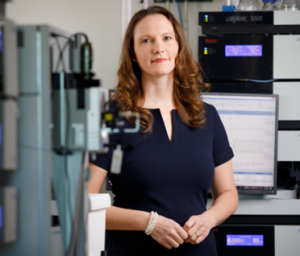GlyGen Webinar Series: Difference between revisions
No edit summary |
No edit summary |
||
| Line 1: | Line 1: | ||
The GlyGen project organizes public webinars on diverse topics, ranging from bioinformatics databases to new glycomics analysis techniques producing interesting data. Recordings of the talks are released on the [https://www.youtube.com/playlist?list=PLLcSDnGh0I5024iBWt8ZUYnx6Gjh3_AUu GlyGen YouTube channel]. | The GlyGen project organizes public webinars on diverse topics, ranging from bioinformatics databases to new glycomics analysis techniques producing interesting data. Recordings of the talks are released on the [https://www.youtube.com/playlist?list=PLLcSDnGh0I5024iBWt8ZUYnx6Gjh3_AUu GlyGen YouTube channel]. | ||
== | == April 18, 2023 - Harry Brumer == | ||
[[File: | [[File:HarryBrumer.png|thumb|Harry Brumer, PhD]] | ||
'''CAZypedia – A Living Encyclopedia of Carbohydrate-Active Enzymes''' | |||
'''Harry Brumer, PhD'''<br/> | |||
Department of Chemistry<br/> | |||
The University of British Columbia<br/> | |||
Vancouver, BC, Canada | |||
CAZypedia was initiated in 2007 to create a comprehensive, living encyclopedia of the carbohydrate-active enzymes (CAZymes) and associated carbohydrate-binding modules. CAZypedia is closely connected with the actively curated CAZy database, which provides a sequence-based foundation for the biochemical, mechanistic, and structural characterization of these diverse proteins. Now comprising over 200 individual Curator Approved family pages, , CAZypedia is a successful example of dynamic, community-driven, and expert-based biocuration. | |||
'''Webex Meeting Details''' | '''Webex Meeting Details''' | ||
Date: Tuesday | Date: Tuesday April 18, 10am ET | ||
Meeting link: https://gwu.webex.com/gwu/j.php?MTID=m7f290a1348e2f07a418933d198d64b45 | Meeting link: https://gwu.webex.com/gwu/j.php?MTID=m7f290a1348e2f07a418933d198d64b45 | ||
Meeting number: 2621 583 1125 | Meeting number: 2621 583 1125 | ||
Password: GlyGenTalks | Password: GlyGenTalks | ||
'''Link''': [https://www.cazypedia.org/index.php/Main_Page CAZypedia] | |||
== March 28, 2023 - Rebekah L. Gundry == | |||
[[File:RebekahLGundry.png|thumb|Rebekah L. Gundry, PhD]] | |||
'''Expanding our View of the Cardiac Surfaceome: New Bioinformatic Tools and Technologies for Mapping Glycoproteins and Glycans from Small Sample Sizes''' | |||
'''Rebekah L. Gundry, PhD'''<br/> | |||
Department of Cellular & Integrative Physiology, College of Medicine<br/> | |||
University of Nebraska Medical Center<br/> | |||
Omaha, NE, USA | |||
Cell surface glycoproteins and glycans play critical roles in a range of biological functions and disease processes. However, the lack of facile methods for sample preparation and data analysis has historically posed major challenges to their characterization. This presentation will describe the new CellSurfer and glyPAQ platforms for robust and rapid mass spectrometry-based analysis of cell surface glycoproteins and glycans and their applications to the human heart. | |||
'''Link''': [https://www.unmc.edu/physiology/faculty/gundry.html Lab webpage] | |||
== February 07, 2023 - Christopher M. West == | == February 07, 2023 - Christopher M. West == | ||
[[File:ChrisWest.jpg|thumb|Christopher M. West, PhD | [[File:ChrisWest.jpg|thumb|Christopher M. West, PhD]] | ||
'''A brief excursion through the glycobiology of unicellular eukaryotes''' | '''A brief excursion through the glycobiology of unicellular eukaryotes''' | ||
'''Christopher M. West, PhD'''<br/> | |||
Complex Carbohydrate Research Center<br/> | |||
University of Georgia<br/> | |||
Athens, GA, USA | |||
Unicellular eukaryotes have evolved diverse adaptations to many earthly environments, including as pathogens of human and plant hosts. Their glycosylation is often similarly varied, and the extant record reflects a combination of evolutionary history and contributions to fitness that are only beginning to be explored in detail. I will introduce select aspects of the glycomics, glycogenomics and glycobiology of the soil-borne amoebozoan ''Dictyostelium discoideum'', the apicomplexan human pathogen ''Toxoplasma gondii'', and the agent for Chagas disease ''Trypanosoma cruzi''. | Unicellular eukaryotes have evolved diverse adaptations to many earthly environments, including as pathogens of human and plant hosts. Their glycosylation is often similarly varied, and the extant record reflects a combination of evolutionary history and contributions to fitness that are only beginning to be explored in detail. I will introduce select aspects of the glycomics, glycogenomics and glycobiology of the soil-borne amoebozoan ''Dictyostelium discoideum'', the apicomplexan human pathogen ''Toxoplasma gondii'', and the agent for Chagas disease ''Trypanosoma cruzi''. | ||
'''Link''': [https://www.bmb.uga.edu/research/lab/west Lab webpage] | |||
== December 06, 2022 - Lingjun Li == | == December 06, 2022 - Lingjun Li == | ||
[[File:LingjunLi.jpg|thumb|Lingjun Li, PhD | [[File:LingjunLi.jpg|thumb|Lingjun Li, PhD]] | ||
'''Advancing Glycomics and Glycoproteomics via MultiplexedChemical Tagging Technology''' | '''Advancing Glycomics and Glycoproteomics via MultiplexedChemical Tagging Technology''' | ||
'''Lingjun Li, PhD'''<br/> | |||
School of Pharmacy and Department of Chemistry<br/> | |||
University of Wisconsin-Madison<br/> | |||
Madison, WI, USA | |||
Glycosylation is one of the most important and most complex protein post-translational modifications. Alterations in glycomic profiles have been linked to various diseases, including cancer, neurodegenerative disorders, and cardiovascular problems. Thus, new methods are needed for quantitative analysis of glycans to facilitate the elucidation of their diverse functional roles in human diseases.Advances in mass spectrometry (MS)-based glycoproteomics and glycomics are increasingly enabling qualitative and quantitative approaches for site-specific structural analysis of protein glycosylation. In this presentation, Iwill describe our recent efforts in developing both MS1 and MS2-based relative quantification strategies for glycomic and glycoproteomicanalysis ofbiological samples. Several cost-effective and novel isobariclabeling reagents will be highlighted for their utility in quantitativeglycanand glycopeptideanalyses ofhuman serum and cerebrospinal fluid samples. | Glycosylation is one of the most important and most complex protein post-translational modifications. Alterations in glycomic profiles have been linked to various diseases, including cancer, neurodegenerative disorders, and cardiovascular problems. Thus, new methods are needed for quantitative analysis of glycans to facilitate the elucidation of their diverse functional roles in human diseases.Advances in mass spectrometry (MS)-based glycoproteomics and glycomics are increasingly enabling qualitative and quantitative approaches for site-specific structural analysis of protein glycosylation. In this presentation, Iwill describe our recent efforts in developing both MS1 and MS2-based relative quantification strategies for glycomic and glycoproteomicanalysis ofbiological samples. Several cost-effective and novel isobariclabeling reagents will be highlighted for their utility in quantitativeglycanand glycopeptideanalyses ofhuman serum and cerebrospinal fluid samples. | ||
[https://www.youtube.com/watch?v=ZeFY3nHLItw&list=PLLcSDnGh0I5024iBWt8ZUYnx6Gjh3_AUu | |||
'''Recording of the Talk''': [https://www.youtube.com/watch?v=ZeFY3nHLItw&list=PLLcSDnGh0I5024iBWt8ZUYnx6Gjh3_AUu YouTube] | |||
'''Link''': [https://apps.pharmacy.wisc.edu/sopdir/lingjun_li/index.php Lab webpage] | |||
Revision as of 17:18, 7 April 2023
The GlyGen project organizes public webinars on diverse topics, ranging from bioinformatics databases to new glycomics analysis techniques producing interesting data. Recordings of the talks are released on the GlyGen YouTube channel.
April 18, 2023 - Harry Brumer
CAZypedia – A Living Encyclopedia of Carbohydrate-Active Enzymes
Harry Brumer, PhD
Department of Chemistry
The University of British Columbia
Vancouver, BC, Canada
CAZypedia was initiated in 2007 to create a comprehensive, living encyclopedia of the carbohydrate-active enzymes (CAZymes) and associated carbohydrate-binding modules. CAZypedia is closely connected with the actively curated CAZy database, which provides a sequence-based foundation for the biochemical, mechanistic, and structural characterization of these diverse proteins. Now comprising over 200 individual Curator Approved family pages, , CAZypedia is a successful example of dynamic, community-driven, and expert-based biocuration.
Webex Meeting Details
Date: Tuesday April 18, 10am ET
Meeting link: https://gwu.webex.com/gwu/j.php?MTID=m7f290a1348e2f07a418933d198d64b45
Meeting number: 2621 583 1125
Password: GlyGenTalks
Link: CAZypedia
March 28, 2023 - Rebekah L. Gundry

Expanding our View of the Cardiac Surfaceome: New Bioinformatic Tools and Technologies for Mapping Glycoproteins and Glycans from Small Sample Sizes
Rebekah L. Gundry, PhD
Department of Cellular & Integrative Physiology, College of Medicine
University of Nebraska Medical Center
Omaha, NE, USA
Cell surface glycoproteins and glycans play critical roles in a range of biological functions and disease processes. However, the lack of facile methods for sample preparation and data analysis has historically posed major challenges to their characterization. This presentation will describe the new CellSurfer and glyPAQ platforms for robust and rapid mass spectrometry-based analysis of cell surface glycoproteins and glycans and their applications to the human heart.
Link: Lab webpage
February 07, 2023 - Christopher M. West

A brief excursion through the glycobiology of unicellular eukaryotes
Christopher M. West, PhD
Complex Carbohydrate Research Center
University of Georgia
Athens, GA, USA
Unicellular eukaryotes have evolved diverse adaptations to many earthly environments, including as pathogens of human and plant hosts. Their glycosylation is often similarly varied, and the extant record reflects a combination of evolutionary history and contributions to fitness that are only beginning to be explored in detail. I will introduce select aspects of the glycomics, glycogenomics and glycobiology of the soil-borne amoebozoan Dictyostelium discoideum, the apicomplexan human pathogen Toxoplasma gondii, and the agent for Chagas disease Trypanosoma cruzi.
Link: Lab webpage
December 06, 2022 - Lingjun Li

Advancing Glycomics and Glycoproteomics via MultiplexedChemical Tagging Technology
Lingjun Li, PhD
School of Pharmacy and Department of Chemistry
University of Wisconsin-Madison
Madison, WI, USA
Glycosylation is one of the most important and most complex protein post-translational modifications. Alterations in glycomic profiles have been linked to various diseases, including cancer, neurodegenerative disorders, and cardiovascular problems. Thus, new methods are needed for quantitative analysis of glycans to facilitate the elucidation of their diverse functional roles in human diseases.Advances in mass spectrometry (MS)-based glycoproteomics and glycomics are increasingly enabling qualitative and quantitative approaches for site-specific structural analysis of protein glycosylation. In this presentation, Iwill describe our recent efforts in developing both MS1 and MS2-based relative quantification strategies for glycomic and glycoproteomicanalysis ofbiological samples. Several cost-effective and novel isobariclabeling reagents will be highlighted for their utility in quantitativeglycanand glycopeptideanalyses ofhuman serum and cerebrospinal fluid samples.
Recording of the Talk: YouTube
Link: Lab webpage